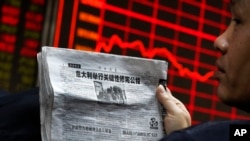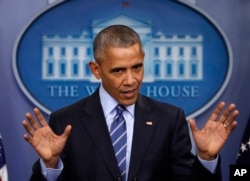A year after losing its status as the world's top destination for foreign investment, China is taking market-opening steps to make the country more appealing to investors; but, with a hostile new administration preparing to take office in Washington, analysts question whether the steps are too little and too late.
China's National Development and Reform Commission announced earlier this month it has removed one-third of the items from a "negative list" that bars or restricts foreign investment in certain industries. The number of regulations restricting foreign investment was also slashed, from 93 to 62.
Among the industries that were opened to foreign investors for the first time were passenger transport, railway equipment, electric vehicle batteries and lithium mining.
Many analysts say the rule changes fail to address the main concerns of foreign investors and are unlikely to provide the economic boost that Beijing wants.
“China has only superficially opened up more sectors to foreign investment. The broader environment is still highly restrictive, with wide swaths of the economy either off limits to foreign investors or with ownership caps that require foreign investors to engage in joint ventures with Chinese partners,” said Scott Kennedy, director of the Project on Chinese Business and Political Economy at the Center for Strategic and International Studies in Washington.
Industry lobbies such as the American Chamber of Commerce in China and the European Chamber of Commerce report that their member companies are losing interest in new investments and business expansion during China's economic slowdown. Few foreign businesses are likely to act on the market-opening measures, analysts said.
Lofty goals or tactics?
“Though some of the limited revisions are welcomed by some of our members, the number of openings falls far short of what would be necessary to reinvigorate diminishing foreign industry confidence in the China market,” said Jake Parker, vice president of the U.S.-China Business Council, in remarks to local media.
The NDRC said the opening had two goals — to “improve transparency of policymaking" and to “let foreign capital play a positive role in China's economic development, industry transformation, and reform and innovation.”
Analysts discern a third objective — to persuade the World Trade Organization to declare China a market economy. That would help the country to offset declining foreign investment and prepare for any aggressive trade moves by the incoming administration of U.S. President-elect Donald Trump in Washington.
The United States, and to a lesser extent the European Union, have been resisting China's efforts to earn the market economy label from the WTO. Opening up the investment market is a good way for China to make a case that it subscribes to free-market principles.
Conceding to India
The Ministry of Commerce recently forecast that foreign direct investment (FDI) will be down in 2016, the second consecutive year of decline.
The country lost its position as the top investment destination to India in 2015, when FDI slowed 23 percent to $56.6 billion. The number of foreign-financed projects dropped by 16 percent that year.
“The big FDI story of the past year is India. After a long period of trailing behind China, the South Asian country is now racing past its formidable rival. India was the highest ranked country by capital investment in 2015, with $63 billion worth of FDI projects announced,” said Courtney Fingar, head of content with London-based fDi Intelligence, while releasing the group's 2016 report.
U.S.-China dispute
U.S. President Barack Obama recently blocked a Chinese company's purchase of German chip equipment manufacturer Aixtron SE on national security grounds. Separately, the U.S. Trade Representative blacklisted Taobao, the online shopping site of China's Alibaba Group, as a “notorious marketplace” for counterfeit goods.
Much tougher U.S. action is possible once Trump takes charge. Trump recently named a harsh China critic, Peter Navarro, as head of the White House-based National Trade Council to advise him on trade policy. Chinese media have said this is a sign Trump is preparing to follow through on campaign promises to take adverse action on Chinese trade and investments.
Beijing-based analysts see the latest opening to investment as a move to counter Trump's arguments that China is an unfair trading partner. Some Chinese experts have publicly urged their government to retaliate against any trade action from Washington.
“U.S.-China commercial relations are in for a rough ride in the coming months, as the Trump administration aggressively pushes China to open its markets further to American imports and investment and applies a more critical eye to Chinese investment in the United States," Kennedy said. "This is likely to induce countermeasures from China, and as a result, two-way trade and investment flows could very well fall substantially.”






